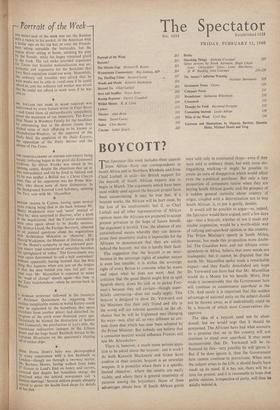BOYCOTT?
THE Spectator this week includes three appeals from Africa—from our correspondents in South Africa and in Northern Rhodesia and from Chief Luthuli in exile—for British support for the boycott of South African exports due to begin in March. The arguments which have been most widely used against the boycott project have been unconvincing. It may be true that, if a boycott works, the African will be hurt most, by the loss of his employment; but if, as Chief Luthuli and all other representatives of African opinion insist, the Africans are prepared to accept present privation in the hope of future benefit, the argument is invalid. True, the absence of any constitutional means whereby they can demon- strate their unanimity makes it impossible for the Africans to demonstrate that they are solidly behind the boycott; but this is hardly their fault.
The suggestion that the boycott is an inter- ference in the sovereign rights of another nation is even less tenable; it is within the sovereign right of every Briton to consume what he wants and reject what he does not want. And the criticism that the good liberal ought first to spill Spanish sherry down his sink or to picket Fort- num's because they sell caviare—though super- ficially convincing—does not really apply. This boycott is designed to show Dr. Verwoerd and his Ministers that their only friend and ally in the world will not tolerate apartheid, on the off- chance that he will be frightened into changing his ways—not, after all, so very different an atti- tude from that which has now been adopted by the Prime Minister. But nobody can believe that a consumer boycott would influence Franco; still less Mr. Khrushchev.
There is, however, a much more serious-ques- tion to be asked about the boycott: can it work? As both Kenneth Mackenzie and Grace Scott confirm in their articles, boycott is an unwieldy weapon. It is powerful where there is a specific, limited objective: where the results are easily visible; and where there is general unanimity of purpose among the boycotters. None of these advantages obtain here. If South African goods were sold only in nominated shops—even if they were sold in ordinary shops, but with some dis- tinguishing marking—it might be possible to create an aura of disapproval which would affect even the a-political purchaser. But only a tiny proportion of consumers realise when they are buying South African goods; and the prospect of a sudden general curiosity about country of origin, coupled with a determination not to buy South African, is, to put it gently, slender.
It would still be possible to argue—as, indeed, the Spectator would have argued, until a few days ago—that a boycott, whether or not it made any sizable impression, would be a worth-while way of rallying anti-apartheid opinion in this country. The Prime Minister's speech in South Africa, however, has made this proposition more doubt- ful. The Guardian here, and our African corre- spondents in Africa, believe, that mere words are inadequate; but it cannot be disputed that the words Mr. Macmillan spoke made a remarkable impact—and they finally demolished any hope Dr. Verwoerd can have had that Mr. Macmillan would do a Monty for his benefit. More, they made it inconceivable that the Government here will continue to countenance apartheid at the UN. And surely it is important that this sudden advantage of national unity on the subject should not be thrown away, as it undoubtedly could be by a boycott of which most Conservatives dis- approve.
The idea of a boycott need not be aban- doned; but we would urge that it should be postponed. The Africans have had what amounts to a promise that we in this country will not continue to stand over apartheid. It may seem inconceivable that Dr. Verwoerd will be ;n- fluenced by this—very possibly he will ignore it. But if he does ignore it, then the Government here cannot continue to prevaricate. When next the subject arises in the UN, it should finally have made up its mind. If it has not, there. will be a time for protest; and it is reasonable to hope that public opinion, irrespective of party, will then bo solidly behind it.






































 Previous page
Previous page